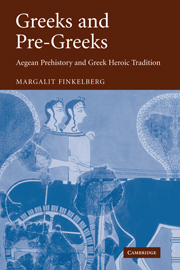Book contents
- Frontmatter
- Contents
- List of maps
- List of figures
- Preface
- List of abbreviations
- Chapter 1 Introduction
- Chapter 2 The heterogeneity of Greek genealogy
- Chapter 3 The pre-Hellenic substratum reconsidered
- Chapter 4 Kingship in Bronze Age Greece and Western Asia
- Chapter 5 Marriage and identity
- Chapter 6 The spread of the Greek language
- Chapter 7 The end of the Bronze Age
- Chapter 8 Continuities and discontinuities
- Appendix: The Testament of Hattusili
- List of references
- Index of passages cited
- General index
Appendix: The Testament of Hattusili
Published online by Cambridge University Press: 22 September 2009
- Frontmatter
- Contents
- List of maps
- List of figures
- Preface
- List of abbreviations
- Chapter 1 Introduction
- Chapter 2 The heterogeneity of Greek genealogy
- Chapter 3 The pre-Hellenic substratum reconsidered
- Chapter 4 Kingship in Bronze Age Greece and Western Asia
- Chapter 5 Marriage and identity
- Chapter 6 The spread of the Greek language
- Chapter 7 The end of the Bronze Age
- Chapter 8 Continuities and discontinuities
- Appendix: The Testament of Hattusili
- List of references
- Index of passages cited
- General index
Summary
The so-called Testament of Hattusili is a Hittite–Akkadian bilingual inscription which contains Hattusili's address to the Hittite nobles at the end of his reign. The passage concerning the royal succession runs as follows:
The young Labarna I proclaimed to you (nu-us-ma-as TUR-la-an la-ba-ar-na-an te-nu-un), saying ‘He shall sit upon the throne’; I called him my son (DUMU-la-ma-an), embraced (?) him, and cared for him continually. But he showed himself a youth not fit to be seen … The word of the king he has not laid to the heart, but the word of his mother, the serpent, he has laid to heart … Enough! He is my son no more … Then his mother bellowed like an ox: ‘They have torn asunder the womb in my living body! They have ruined him and you will kill him!’ Have I, the king, done him any evil? … Behold, I have given my son Labarna a house, I have given him [arable land] in plenty, [sheep in] plenty I have given him. Let him now eat and drink. [So long as he is good] he may come up to the city. [But] if he stand forward (?) as [a trouble-maker(?) … then he shall not come up, but shall remain [in his house].
Behold, Mursili is now my son … [When] three years have elapsed, he shall go on a campaign … [The daughter has disgraced my person] and my name … A father's word she has cast aside … Now she [is banished from the city] … In the country [a house has been assig]ned to her; she may eat and drink, [but you] must not do [her harm]. She has done wrong; I will not do [wrong in return]. She [has not called] me father, I will not call her my daughter …
- Type
- Chapter
- Information
- Greeks and Pre-GreeksAegean Prehistory and Greek Heroic Tradition, pp. 177 - 182Publisher: Cambridge University PressPrint publication year: 2006



